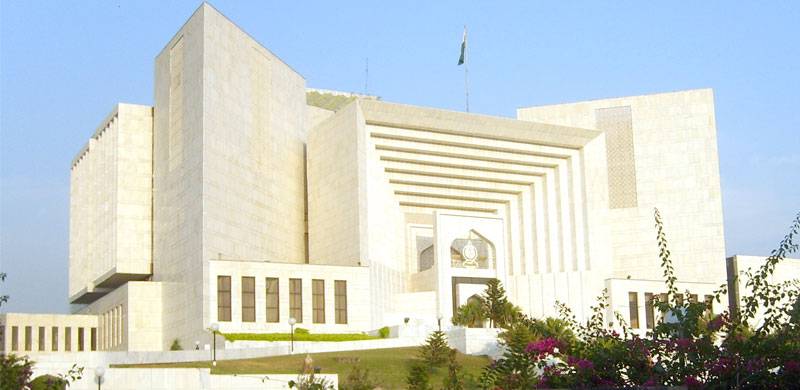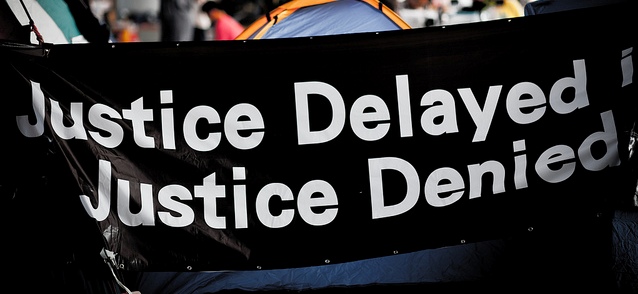
There exists famous legal maxim “Justice delayed is justice denied”. Currently, the judicial system of Pakistan is confronting major problem of slow progress in dispensing justice. It has for decades been marred by excessive delays and pendency. The state takes the pain of doing justice and has the fundamental responsibility to ensure inexpensive and expeditious justice as elucidated in Article 37(d) of Constitution of Pakistan. For example, Ghulam Sarwar and Ghulam Qadir, two brothers, were executed by prison authorities a year before the Supreme Court eventually pronounced them innocent. They were acquitted by the apex court after having endured 24 and 11 years in prison respectively. They might not know that Article 10-A of the Constitution guarantees them a “fair trial and due process” while Article 37 promises them “inexpensive and expeditious justice”.
Judiciary is the cognizant of this failing and has on several occasions acknowledged it. Chief Justice Mian Saqib Nisar stressed the need for judicial reform to address the increasing public perception about delay in the provision of justice. As per the latest statistics of the Law and Justice Commission of Pakistan (LJCP), there are 38,539 cases pending with the SC, 293,947 with the five high courts and 1,869,886 cases with the subordinate judiciary of the four provinces and the federal capital.
A study conducted on the instructions of Jawad S Khawaja, a retired chief justice, concluded that “on average it takes 25 years for a case instituted in a court of first instance to be finally determined by the Supreme Court”. Example: The case of Mazhar Farooq, who had to remain behind the bars for twenty four years to finally get acquittal from Supreme Court in 2016. We understand that there will be many such cases like that of Mazhar who will be awaiting justice over the last many years while in prison.
The question that arises, what are the gaps that really obfuscate the process of the timely dispensation of justice? Answer is, our toothless laws are not only reason behind dismal performance of the judicial department. Many other factors contribute to the delays. Lawyers prolong the matter by not appearing before the court of law. Practically speaking, they pray for unnecessary and frequent adjournments. They are equally responsible for slow progress of court cases. Bar associations issue strike calls on petty issues which not only delayed court cases but also resulted in the backlog of justice. A research conducted by Legal Aid Society demonstrates that existing provisions in the civil procedure code 1908, which specify the time periods for different stages of a civil trial, are hardly followed and enforced. Averagely defendants spent six months to file the written statement after institution of suit, while as per law it is to be filed within thirty days. The federal and provincial departments are not playing their respective role in the interest of justice. If they have taken effective measures, bulk of cases would have been resolved before approaching court of law.

Let’s take this example; recently HESCO illegally disconnected our electricity despite no dues and arrears on our authorized electrical meter. I exhausted alternate remedies before taking up the matter in court and filed application before concerned HESCO officials. Regrettably, my grievance was not addressed by concerned officials and I, being disappointed, started to seek out the lamps of justice and decided to litigate my grievance before the honorable High Court of Sindh by moving constitutional petition under Article 199 of the Constitution. Like this one, thousands of petitions are pending due to lack of justifiable performance by departments. Scarcity of judges also contributes to the problem. Few judges are endeavoring to adjudicate thousands of cases as there are seventeen judges in Apex court of Pakistan and pendency of cases has reached over 40,000.
To conclude, although numerous solutions can be proposed, the following suggestions are critical.
Firstly, the criminal procedural law (Criminal Procedure Code) and criminal substantive law mostly known as Pakistan Penal Code (PPC) are 120 years and 158 years old respectively while the civil procedure code is 110 years old. A product of the British Raj, the nature of criminal disputes was altogether different and the resources and technologies available to courts, lawyers and the litigant public were incomparable. They allow for endless rounds of appeal, review and revisions. There is dire need of enacting the laws according to requirements of modern era in order to speed up the pace of pending cases and improve the efficiency of judicial system. This is where the legislature must act.
Secondly, Lawyers should avoid from unnecessary and frequent adjournments that applicant may get final decision earlier. In similar manner, the bar associations should abstain from strikes on trivial problems and attend the court proceedings on regular basis in the interest of justice.
Thirdly, all current judicial vacancies need to be filled and the number of judges should be increased in high courts and district courts with high-case pendency.
Fourthly, all federal and provincial departments should play their own role in eliminating general masses’ issues as much as they can.
As compared to a JIT on the Panama leaks, what is more urgent, we guess, is a JIT on the issue of delayed justice. Trying to solve this problem now may help our future chief justices and judges instead of shedding tears over the Pakistani judicial system.
Judiciary is the cognizant of this failing and has on several occasions acknowledged it. Chief Justice Mian Saqib Nisar stressed the need for judicial reform to address the increasing public perception about delay in the provision of justice. As per the latest statistics of the Law and Justice Commission of Pakistan (LJCP), there are 38,539 cases pending with the SC, 293,947 with the five high courts and 1,869,886 cases with the subordinate judiciary of the four provinces and the federal capital.
Also read: Asia Bibi and Our Criminal Justice System
A study conducted on the instructions of Jawad S Khawaja, a retired chief justice, concluded that “on average it takes 25 years for a case instituted in a court of first instance to be finally determined by the Supreme Court”. Example: The case of Mazhar Farooq, who had to remain behind the bars for twenty four years to finally get acquittal from Supreme Court in 2016. We understand that there will be many such cases like that of Mazhar who will be awaiting justice over the last many years while in prison.
The question that arises, what are the gaps that really obfuscate the process of the timely dispensation of justice? Answer is, our toothless laws are not only reason behind dismal performance of the judicial department. Many other factors contribute to the delays. Lawyers prolong the matter by not appearing before the court of law. Practically speaking, they pray for unnecessary and frequent adjournments. They are equally responsible for slow progress of court cases. Bar associations issue strike calls on petty issues which not only delayed court cases but also resulted in the backlog of justice. A research conducted by Legal Aid Society demonstrates that existing provisions in the civil procedure code 1908, which specify the time periods for different stages of a civil trial, are hardly followed and enforced. Averagely defendants spent six months to file the written statement after institution of suit, while as per law it is to be filed within thirty days. The federal and provincial departments are not playing their respective role in the interest of justice. If they have taken effective measures, bulk of cases would have been resolved before approaching court of law.

Let’s take this example; recently HESCO illegally disconnected our electricity despite no dues and arrears on our authorized electrical meter. I exhausted alternate remedies before taking up the matter in court and filed application before concerned HESCO officials. Regrettably, my grievance was not addressed by concerned officials and I, being disappointed, started to seek out the lamps of justice and decided to litigate my grievance before the honorable High Court of Sindh by moving constitutional petition under Article 199 of the Constitution. Like this one, thousands of petitions are pending due to lack of justifiable performance by departments. Scarcity of judges also contributes to the problem. Few judges are endeavoring to adjudicate thousands of cases as there are seventeen judges in Apex court of Pakistan and pendency of cases has reached over 40,000.
Lawyers should avoid from unnecessary and frequent adjournments that applicant may get final decision earlier. In similar manner, the bar associations should abstain from strikes on trivial problems and attend the court proceedings on regular basis in the interest of justice.
To conclude, although numerous solutions can be proposed, the following suggestions are critical.
Firstly, the criminal procedural law (Criminal Procedure Code) and criminal substantive law mostly known as Pakistan Penal Code (PPC) are 120 years and 158 years old respectively while the civil procedure code is 110 years old. A product of the British Raj, the nature of criminal disputes was altogether different and the resources and technologies available to courts, lawyers and the litigant public were incomparable. They allow for endless rounds of appeal, review and revisions. There is dire need of enacting the laws according to requirements of modern era in order to speed up the pace of pending cases and improve the efficiency of judicial system. This is where the legislature must act.
Secondly, Lawyers should avoid from unnecessary and frequent adjournments that applicant may get final decision earlier. In similar manner, the bar associations should abstain from strikes on trivial problems and attend the court proceedings on regular basis in the interest of justice.
Thirdly, all current judicial vacancies need to be filled and the number of judges should be increased in high courts and district courts with high-case pendency.
Fourthly, all federal and provincial departments should play their own role in eliminating general masses’ issues as much as they can.
As compared to a JIT on the Panama leaks, what is more urgent, we guess, is a JIT on the issue of delayed justice. Trying to solve this problem now may help our future chief justices and judges instead of shedding tears over the Pakistani judicial system.
